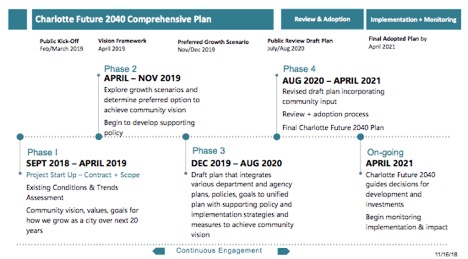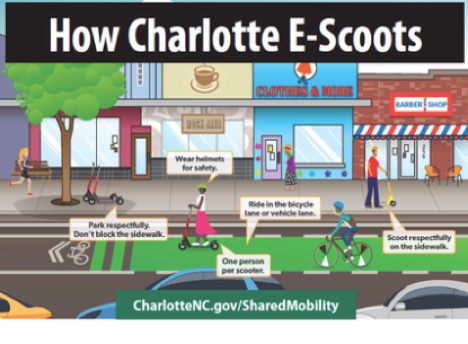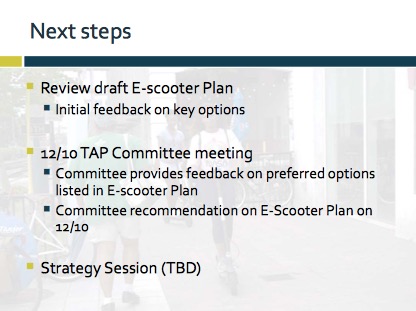Shared mobility e-scooter plan unveiled at transportation and planning committee
At their November meeting, the Committee received updates on the Comprehensive Plan, Transit-Oriented Development Ordinances, and e-scooters.
Comprehensive Plan Update + TOD Ordinance Update
Garret Johnson, City of Charlotte Planning Department, gave the Committee a brief update on the Comprehensive Plan. The scope of work for the consulting firm now includes 4 phases instead of three, but the timeline remains the same.

Click here to see all the slides from the meeting
Planning for the Transit Oriented Development Ordinance (TOD) updates also remain on schedule as the Planning Department continues to conduct community stakeholder engagement sessions and individual meetings with members of Council. The TOD ordinances will be filed in late December, followed by a public hearing in late winter or early spring, and appear before Council for approval in Spring 2019.
E-Scooters
Dan Gallagher, Charlotte Department of Transportation’s Deputy Director, introduced the Committee to the draft Shared Mobility E-Scooter Plan. Staff diligently compiled data, peer city research, and lessons learned about dockless bike and scooter operation over the past year into a public report.

Read the full plan by scrolling through staff presentations here.
The report outlines current practices and describes four areas where the City needs to offer more guidance to ensure safety and ease of use for riders. These areas and recommendations as copied from the plan are listed below.
- Safety & Education: The City of Charlotte aims to collaborate with e-scooter operators, users, and the general public to manage e-scooters in a way that maintains order and safety, promotes an inclusive system, and encourages ridership.
- Invest in Infrastructure & Parking: The wide popularity of e-scooters is evidence of the significant latent demand in Charlotte for more non-automobile transportation choices. Investing in a connected, safe, and comfortable bicycle network, that also accommodates e-scooter use, is more important than ever.
- Operations & Permitting: E-scooters should be managed so that they can align as closely as possible with expectations for the safe operation of bicycles in the built environment.
- Data Sharing & Learning: E-scooters are a part of a greater shared mobility system that offers more transportation choices to Charlotte residents. Shared mobility also includes bike share (dockless and dock-based), rideshare (Lyft, Uber, ZipCar, etc.), and transit service.
After Gallagher’s presentation, which clearly outlined the benefits of e-scooters, members of Council seemed more preoccupied with their personal observations and gripes with individual scooter users.
Mayor Pro Tem Julie Eiselt was concerned that she hasn’t seen one person wearing a helmet while operating a scooter, even after Lime and Bird handed out thousands of free helmets in partnership with a CDOT month-long safety campaign.
Council Members Braxton Winston, Tariq Bokhari, and Dimple Ajmera all spoke highly of scooters as invaluable transportation choices. Ajmera noted that we have to change our driving culture in Charlotte to better accommodate alternative modes of transportation while Winston and Bokhari both agreed that the market should decide the number of scooters available for users.

Sustain Charlotte’s Position
Dockless bikes and e-scooters are a positive addition to the transportation landscape of Charlotte. Over the past year, 1,523,567 miles have been ridden on e-scooters since they arrived this spring, reducing single-occupancy vehicle trips, lowering congestion on our busy streets, and bringing down total carbon emissions. We urge City Council to consider the following recommendations:
1. Make bicycle infrastructure funding a Council priority.
Expanding our city’s network of safe, connected bike lanes benefits scooter users, cyclists, pedestrians, and drivers.
A key example of protected infrastructure is the Uptown cycle track. For example, when the Uptown cycle track is completed, it will be a vital connection through the city not only for those on a bike but also for those on scooters.
2. Do not tax dockless bike and scooter operators for using our streets without taxing car share operators, too.
3. Allow the market to decide the number of shared scooters and bikes, just as we do with car share.
We agree with Council Members Bokhari and Winston in saying that the market should determine fleet size. A dynamic cap allows the number of scooters to ebb and flow based on demand. Currently, our average daily rides per scooter are twice the national average.
Also, increasing the fleet size will allow for shared scooters and bikes to reach more neighborhoods and thereby increase accessibility.
The Charlotte Observer also covered this Transportation and Planning Committee meeting. Read their article here. You can also watch the meeting from the recorded Facebook live stream here.
Thanks for reading!
As a nonprofit, community support is essential for us to keep doing what we do — including providing free articles like this. If you found this article helpful, please consider supporting Sustain Charlotte.
Want to stay in the loop? Subscribe to our weekly newsletter and follow us on Instagram, Facebook, and Twitter.
